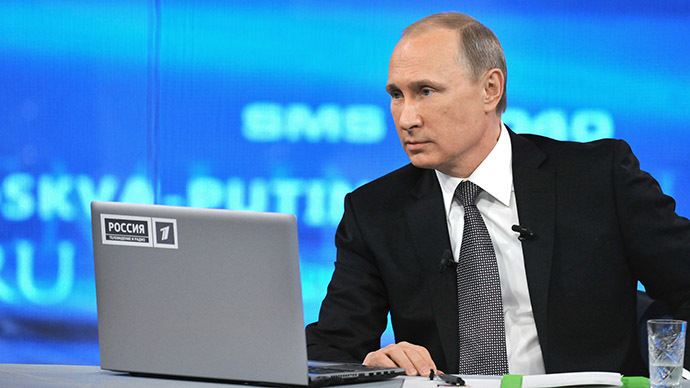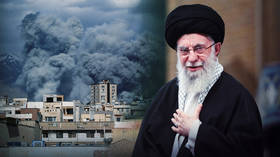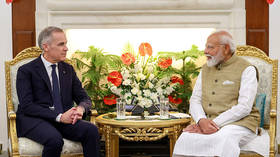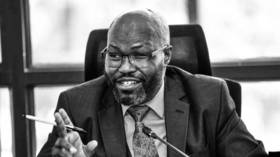Putin makes it clear that Moscow will continue to stand up to America

Much commentary about Russia is hyperbolic and infused with emotive exaggeration. By contrast, Vladimir Putin’s 13th annual Q&A was an extremely calm and assured affair.
So that’s a baker’s dozen for Putin: Thirteen years of a unique question and answer marathon which has no comparison that I know of in the rest of the world. Whatever your opinion of the Russian president, you have to admire both his stamina and his grasp of his brief.
READ MORE: Putin: Russia must use sanctions to achieve new development horizons
While many Western leaders can barely issue a complete sentence without a teleprompter, Putin is able to wax lyrical for just shy of 4 hours on topics as diverse as milk prices and fleeing a burning banya with a former German Chancellor. One questioner even solicited relationship advice.
On the subject of dairy, I don’t think anyone believes that the president pops down to Olga’s product store on a regular basis to check grocery costs. However, his mastery of milk industry intricacies did reveal something – Putin isn’t a bluffer and he forensically studies consumer data supplied to him. It is part of his populist style of governance and it also partially explains why he’s managed to maintain overwhelming support for so long. Sections of the Western media will come up with a million reasons to explain Putin's high poll ratings – most of them nefarious – but few will concede that perhaps he’s just good at his job?
The new superpower age
Aside from milk and some – pertinent and legitimate – questions on the rising cost of living in Russia, the other major takeaway from the Q&A was Putin reiterating his stance on what he perceives to be renewed US imperialism.
“Big superpowers which pretend to be exceptional and consider themselves the only center of power in the world do not need allies, they need vassals,” he said. “I’m talking about the United States. Russia cannot exist in such a system of relations.”
Back in December, the President mused: “Sometimes you don’t even know to whom it is better to talk: The governments of certain countries or directly with their American patrons.”
READ MORE: Putin wants neither Russian Empire nor army of clones: Q&A highlights
Senior Russian officials have consistently expressed the view that a whole host of leading Western nations don’t have an independent foreign policy but instead simply follow diktats from Washington. The mass boycott by European states of next month’s Moscow celebrations of the 70th anniversary of the Soviet victory in World War II probably serves to solidify this opinion in the Kremlin.
Reading between the lines, Putin appears to be expressing his disappointment with some European countries he once assiduously promoted friendships with. It’s an open secret around Moscow that one of the central motivations for Russia’s sudden tilt eastwards to China’s warm embrace is a realization that a rapprochement with Europe is currently impossible.
To Dublin or Hong Kong?
For years, Kremlin officials often quoted the Belgian politician Jean-Francois Thiriart, who dreamed of a united Europe “from Dublin to Vladivostok.” Now, a concordant Asia from Hong Kong to Kaliningrad seems more likely.
In the 1960’s, Thiriart’s Jeune Europe movement had advocated a Europe, “neither Moscow nor Washington,” as a third superpower in the darkest days of the Cold War.
Forty years later, it was widely believed that many in Russia and Germany – including Putin and Gerhard Schroeder – hoped for an adapted version of Thiriart’s vision. A detente between Moscow and Berlin to counterbalance the USA and the emerging Chinese superpower. This dream has been on life support for years and it’s fair to say that the Ukraine crisis finally killed it.
From Putin’s Q&A comments, it’s pretty clear that the President considers EU Europe a prisoner of American policy. He elaborated by comparing the US system to that of Stalin and Khrushchev’s post-war Soviet Union. “After World War II we tried to impose on many Eastern European nations our model of development and we did it through force. We must acknowledge that,” he admitted. “There’s nothing good in it, it still affects us today…the Americans are doing something like that now, trying to impose their model on virtually the entire world. They will fail too.”
Keep Germany down and Russia out
This all suggests that Putin is happy to play the long game and line up a putative Russian/Chinese alliance against the US and European master/slave relationship. Nevertheless, my bet is that Russian policy makers will continue to hope for a European policy shift. The EU is unstable, if it were to split there’s a strong chance that Germany could try to salvage a ‘core Europe’ gathered around its powerful economy.
READ MORE: Putin demands respect for Russia, pledges never to become US vassal
A sizable and influential wing in Berlin would press for that ‘rump EU’ to be independent of Washington. Plenty in both Germany and Russia are mindful of Pug Ismay’s famous thoughts on keeping Germany down and the Russians out. Furthermore, a lot of them resent it.
Conversely, Russia’s pivot to Asia does not enjoy universal support inside the country. Large swathes of both the elite and general populace distrust China and the vast majority of Russians self-identify as Europeans. Also, there’s little doubt that (at least) Germany, Japan, Italy and France would prefer Russia to eventually return to the G8 and place a foot back into the Western tent.
For that to happen, either US policy towards Russia would have to tilt 180 degrees or Europe would need to stand up to Washington. Both scenarios are extremely unlikely. In actual fact, I’d venture that Russophobia in America will hit fresh heights during the 2016 Presidential campaign. As Winnipeg’s finest rockers,Bachman-Turner Overdrive, sang: ‘You ain’t seen nothing yet’!
The statements, views and opinions expressed in this column are solely those of the author and do not necessarily represent those of RT.
The statements, views and opinions expressed in this column are solely those of the author and do not necessarily represent those of RT.













